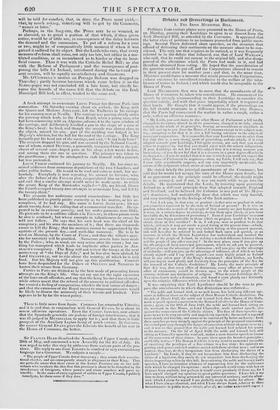Louis Plump continued his journey to Neuilly. lle has since
re- ceived addresses from numerous deputations of the two Chambers, and other public bodies. Ile is said to be cool and calm as usual, but me- lancholy. Everybody is now repeating his answer to Gi izar, who, after the failure of the FrEscia plot, congratulated him on his escape, and said that a similar attempt would never be made again : to which the astute King of the Barricades replied—" A h, my friend, Henry the Fourth escaped twenty-two attempts to assassinate him, and fell by the twenty-third."
Time assassin has undergone several examinations: but little has been published to gratify public curiosity as to his motive, or his ac- complices, if he bud any. His name is Louis Aunt:ann ; his age about twenty-four ; his calling that of acomnaercial travtller. Ile ap- peared to be in extreme poverty, and his under garments were filthy. Ile pretends to be a sublime villain a la FiESCUS ; in whose prison-room he also is confined ; but whose example in talkativeness he swears he
will not follow. He says that his own head was the chief of his conspiracy, and his arms the members of it ; that there are thousands sworn to kill the King; that his motives cannot be appreciated by the
egotists of the present day,—and such-like nonsense. He is to be tried on Monday, by the Court of Peers ; and thus the villain's appe- tite for notoriety will be gratified. Numerous arrests have been made by the Police ; who, as usual, are very active after the event ; but no- thing has transpired which leads to implicate other parties in A br- BEADD.8 conspiracy. The King will not review the troops at the next anniversary of "the Days of July ;" and be has also been advised, by Lord GRAN VILLE. not to ride about the country, of which he is very fond. But his Majesty will not give up this gratification. Couriers have been despatched for the Dukes of ORLEANS and NEMOURS to hasten their return from Germany.
Parties in Paris are divided as to the best mode of preventing future attempts on the King's life. One set cry out for the rigid execution of the laws on all offenders, and say that the King has been too clement ; while others assert that the refusal of the amnesty to political offenders has created a feeling of exasperation, which is the real source of danger ; and that the extension of the Royal mercy to numerous prisoners would be likely to disarm the animosity of their friends and kindred. This appears to be by far the wisest policy.


























 Previous page
Previous page